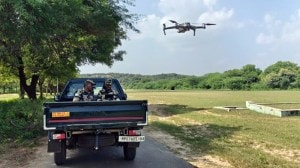NHRC rubs it in Modi: ‘complicity was tacit’
In its second and final report submitted on the Gujarat carnage, the National Human Rights Commission (NHRC) today held the State government...

In its second and final report submitted on the Gujarat carnage, the National Human Rights Commission (NHRC) today held the State government squarely responsible and said the facts indicate ‘‘a complicity that was tacit if not explicit.’’ The report also recommends handing over cases for investigation to the CBI to ensure impartiality.
The NHRC’s 53-page report concludes that ‘‘There is no doubt in the opinion of this Commission that there was a comprehensive failure on the part of the State Government to control the persistent violation of the rights to life, liberty, equality and dignity of the people of the state.’’
Quoting the Central principle of administration of criminal justice, the report says, ‘‘Those against whom allegations are made should not themselves be entrusted with the investigation of those allegations … It would thus be a travesty of the principles of criminal justice if such cases were not transferred to the CBI.’’
The report urges the Centre to intervene under Article 355 of Constitution and ‘‘go beyond a mere invocation of the existing rules’’ on cases when the CBI should take up a case. ‘‘…politically connected persons, named by the victims of the crimes committed, remained at large, many defying arrest. These are grave matters that must not be allowed to be forgiven or forgotten.’’
Reiterating intelligence failure as the cause for the violence, the report states that the ‘‘response of the state government (in its official report) has been unable to rebut this presumption.’’ Till May 10, of 16,245 persons arrested for substantive offence, all but 2,100 have been granted bail. Of the 11,363 Hindus arrested for such offences, eight % remain in custody; while 20 % of the 4,882 Muslims arrested remained in custody, says the report.
It also says:
• On security cover for two High Court judges: ‘‘Indeed, the facts indicate that the response was often abysmal, or even non-existent, pointing to gross negligence in certain instances or, worse still, as was widely believed, to a complicity that was tacit if not explicit’’.
• On KPS Gill’s appointment: ‘‘The appointment implicitly confirms that a failure had occurred earlier to bring under control the persisting violation of the rights to life, liberty, equality and dignity of the people of the state’’.
• On attacks on women and children: ‘‘That report (of Gujarat Government submitted on April 12) also testifies to the assault on the dignity and worth of the human person, particularly of women and children, through acts of rape and other humiliating crimes of violence and cruelty’’.
Victims of atrocities, including rape, were having difficulty in ‘‘having FIRs recorded, in naming those whom they had identified and in securing copies of their FIRs’’.
Many women were not coming forward for recording FIRS because of a lack of policewomen at relief camps, insensitive questioning and too few police desks, which worked only for a few days in the week and stayed open for just two hours every day, says the report.
• On the Naroda Patiya massacre: Though 22 have been arrested, the government is silent on whether they had been released on bail or were in custody. There are also no details on the status of 46 persons arrested in the Sadarpura case of Mehsana district, where 28 persons were reportedly killed.
• ‘The Commission has, therefore, reached the definite conclusion that… there was a comprehensive failure of the state to protect the Constitutional rights of the people of Gujarat, starting with the tragedy in Godhra on February 27, 2002, and continuing with the violence that ensued in the weeks that followed.’’
Photos





- 01
- 02
- 03
- 04
- 05

























